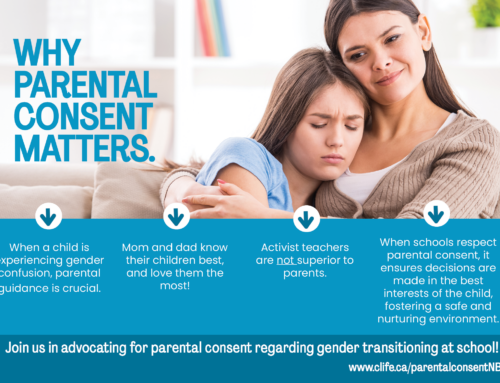 A teacher resource uncovered by the Toronto Sun that suggests teachers change the names of Mother’s and Father’s Day is only the tip of the iceberg in terms of political correctness when it comes to homosexualist propaganda being foisted upon Ontario schools.
A teacher resource uncovered by the Toronto Sun that suggests teachers change the names of Mother’s and Father’s Day is only the tip of the iceberg in terms of political correctness when it comes to homosexualist propaganda being foisted upon Ontario schools.
The Social Justice Begins With Me program, a “literature-based resource kit for early years to Grade 8” is intended to expand upon We’re Erasing Prejudice for Good and assist in the implementation of the Ontario government’s Equity and Inclusive Education Strategy.
The Sun’s Joe Warmington reported that the “celebrations and traditions” section of the “Welcoming & Supporting Lesbian, Gay, Bisexual and Transgender Families” brochure states that Family Day is a time to “celebrate all types of families” and “invite LGBT families to share their traditions.” For Mother’s and Father’s Day, “alternative names could include ‘Love Day’ or ‘GAMES Day’ (Grandmothers, aunts, moms, even sisters).” Teachers are told to discuss “important women/men who care for you” and to give students with homosexual couples as “parents” the option of making two cards. Suggested resources include the Pride Toronto, PFLAG, and mygsa.ca websites, as well as the Social Justice Begins With Me resource kit.
The brochure states, “LGBT families are the fastest growing type of family structure in Canada. As educators, we have the responsibility to ensure our classrooms and schools are welcoming places, and that LGBT families are themselves reflected in the school environment and the curriculum.” Teachers are advised to “use LGBT books, media, pictures as part of your everyday curriculum, include the terms gay, lesbian, bisexual, transgender when describing various families and use teachable moments to address homophobia or transphobia.”
Lisa Woods, who is raising two children with her homosexual partner, told the Toronto Sun that the idea of changing the name of the two holidays is “quite silly.” Her children were already allowed to make special cards in school and there was never any trauma associated with celebrating Mother’s and Father’s Day in school. “Stop screwing with traditions that represent our Canada and its traditional beliefs,” she said.
Sam Hammond, president of the Elementary Teachers’ Federation of Ontario, told John Tory on NewsTalk 1010 that he does not want to get rid of Mother’s or Father’s Day. Rather, the resource was meant to point out that “we need to be very conscious and consider the realities that our teachers and students and children are faced with everyday in our classrooms and in their homes and that’s a very different composition of families.” Hammond said the curriculum resources are intended to help students from alternative and traditional families understand the changes in family structure. He denied that it was a “thinly veiled indoctrination program for LGBT,” insisting that it is “so far from the truth” that it is “disturbing.”
The actual resource kit, however, goes much further than the media is reporting. It is made up of a Teacher Resource Guide and separate booklets for primary, junior, and intermediate students. The resource for the primary grades includes a lesson plan geared towards third graders around the book Daddy’s Roommate about a child raised by two gay men. Teachers are told to discuss “the different types of families,” the terms “gay” and “lesbian,” as well as “gender role stereotyping.”
Fifth graders get to read The Boy in a Dress. The lesson plan includes a chart asking students to agree or disagree with statements such as “boys are different from girls,” “girls are better at looking after children than boys are,” and “little boys shouldn’t play with dolls.” Teachers are prompted to point out the injustice of “gender role stereotyping” and to discuss cross dressing and homophobia. Suggested activities include making “anti-homophobia” posters and displaying them in school, as well as researching “how gender role stereotyping and homophobic attitudes are reinforced in our society.” The Sissy Duckling is another book on the list; the lesson plan invites students to write in journals about what they would do if the protagonist was a victim of “homophobic bullying” in school and to take action in their own school (such as celebrating Pink Day in class).
Grade Six students read In Our Mothers’ House. The lesson plan invites them to brainstorm the “types” of families, and think about and relate to the question, “why are people afraid of differences or things that are new?” In a collage activity, teachers are prompted to “provide some example photos of different couples in relationships (e.g., biracial, same-sex, older couples, etc.), and have students go through magazines and newspapers and cut out different couple pairs.” It asks, “was it easy to find pictures of different kinds of couples? Why or why not? Do the magazines or newspapers accurately represent the diversity in our society?”
Seventh graders are exposed to The Harvey Milk Story – the first openly gay politician in the U.S. – which acts as an opportunity to discuss famous homosexual Canadians, gay-straight alliances, and Pride Day. Parrotfish, about a transgendered child, is the book used for eighth graders to discuss gender and sexual identity, transgenderism, and “transphobia.” It is suggested that students read a survey by the gay activist group EGALE and make a “Take Action on Transphobia Top Ten Actions sheet.”
During these activities, teachers are directed to the ETFO’s LGBT Take Action Kit, which gives them suggestions about how to engage in gay activism with students, teachers, and the school board. Some suggestions include making a “board-wide GSA graduation celebration,” having GSAs for teachers, marching in the Pride Parade, and hosting a gay movie night for families.
The Teacher’s Resource Guide for Social Justice Begins With Me contains a list of books as well as a “Positive Space Positive Place” brochure. The most interesting part of this brochure is its “LGBT History and Timeline,” which absurdly declares a debunked assertion put forward by historian John Boswell that before the 13th century that “the Roman Catholic Church consecrates and celebrates same-sex marriages in Europe. Priests can marry a spouse of the same sex without creating a scandal.” It also states that Michelangelo, Virginia Woolf, Gertrude Stein, Tchaikovsky, and Alexander the Great were “part of the LGBT community.”
The teacher’s guide also includes templates for bias bookmarks that students can fill out and insert into books where they find, for instance, that the hero is “serving sexist, racist, classist, or heterosexist interests” or there is “a lack of representation of certain groups.” The book is also deemed biased if “male pronouns are used for groups of both genders” or “there are words like “forefathers” instead of “ancestors” or “man-made” instead of “fabricated.”
Another activity, “Flower Power,” has students identify power groups in categories such as “sexual orientation,” “faith/religion,” and “family structure.” The groups with the least power are put in the inner petals, while those with the most power are on the outer ones.
The final publication in the resource kit is More Than a Play, a collection of plays for students about social justice and equity. In “Jake’s Progress” by Andrew Moodie, the main character, Jake, does not want to bring homework to a classmate’s house because he or she is raised by two gay men. By the end, he wants to come in and be friends because he finds out that the classmate’s dad is in charge of publicity for the Toronto Raptors basketball team. Questions after the play include, “how did you find yourself reacting to Jake’s views about Pat having two dads?” as well as “do you think Jake is sincere when he confesses at the end of the play, ‘you have two dads. Big deal!’ Do you think Jake has changed or will ever change?” Students are later asked, “do you think it is it (sic) possible for someone who is homophobic to change?”
Social Justice Begins With Me was issued in 2011 and funded by the Ontario Ministry of Education.




